
AI-Studio
AI Studio is an independent app for utilizing LLMs.
Stars: 385
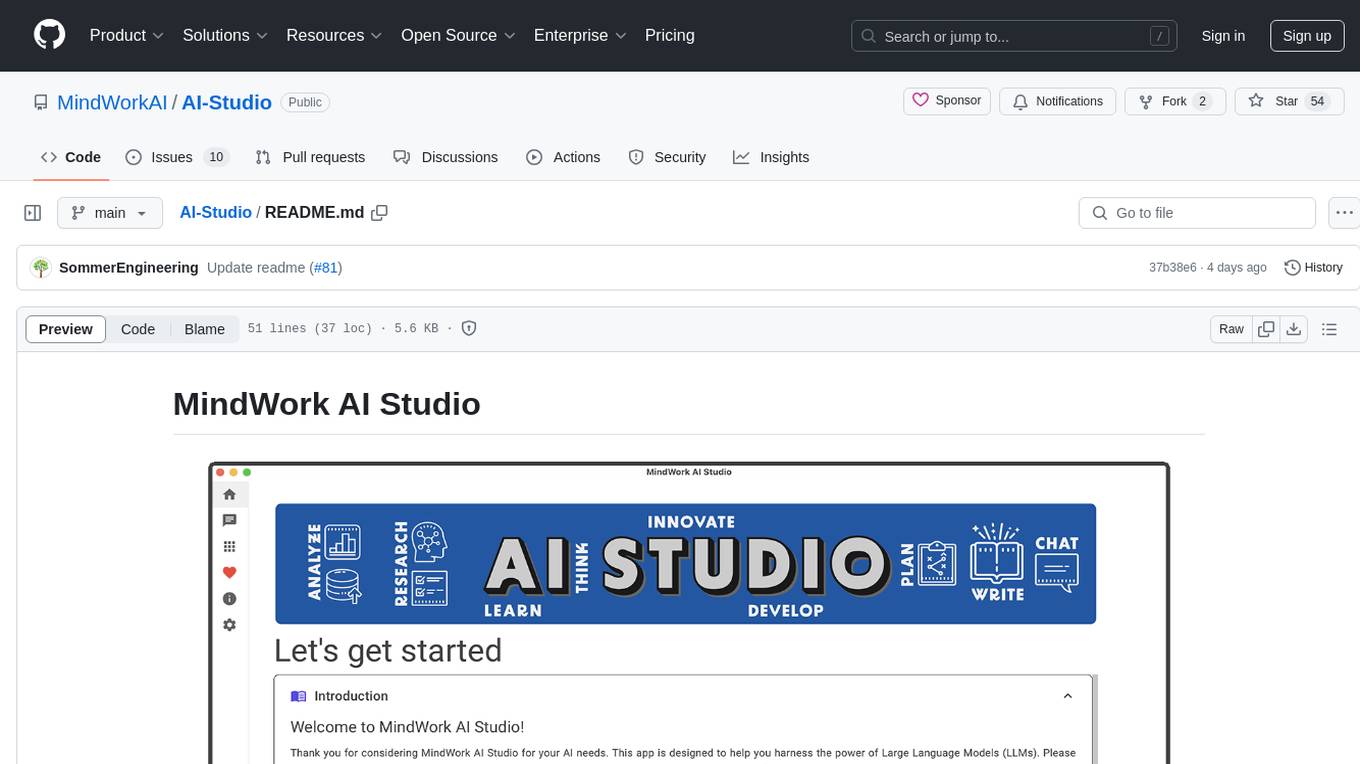
MindWork AI Studio is a desktop application that provides a unified chat interface for Large Language Models (LLMs). It is free to use for personal and commercial purposes, offers independence in choosing LLM providers, provides unrestricted usage through the providers API, and is cost-effective with pay-as-you-go pricing. The app prioritizes privacy, flexibility, minimal storage and memory usage, and low impact on system resources. Users can support the project through monthly contributions or one-time donations, with opportunities for companies to sponsor the project for public relations and marketing benefits. Planned features include support for more LLM providers, system prompts integration, text replacement for privacy, and advanced interactions tailored for various use cases.
README:
Are you new here? Read here what AI Studio is.
Since November 2024: Work on RAG (integration of your data and files) has begun. We will support the integration of local and external data sources. We need to implement the following runtime (Rust) and app (.NET) steps:
- [x]
Runtime: Restructuring the code into meaningful modules (PR #192) - [x]
Define the External Retrieval Interface (ERI) as a contract for integrating arbitrary external data (PR #1) - [x]
App: Metadata for providers (which provider offers embeddings?) (PR #205) - [x]
App: Add an option to show preview features (PR #222) - [x]
App: Configure embedding providers (PR #224) - [x]
App: Implement an ERI server coding assistant (PR #231) - [x]
App: Management of data sources (local & external data via ERI) (PR #259, #273) - [x]
Runtime: Extract data from txt / md / pdf / docx / xlsx files (PR #374) - [ ] (Optional) Runtime: Implement internal embedding provider through fastembed-rs
- [x]
App: Implement dialog for checking & handling pandoc installation (PR #393, PR #487) - [ ] App: Implement external embedding providers
- [ ] App: Implement the process to vectorize one local file using embeddings
- [x]
Runtime: Integration of the vector database Qdrant (PR #580) - [ ] App: Implement the continuous process of vectorizing data
- [x]
App: Define a common retrieval context interface for the integration of RAG processes in chats (PR #281, #284, #286, #287) - [x]
App: Define a common augmentation interface for the integration of RAG processes in chats (PR #288, #289) - [x]
App: Integrate data sources in chats (PR #282)
Since September 2024: Experiments have been started on how we can work on long texts with AI Studio. Let's say you want to write a fantasy novel or create a complex project proposal and use LLM for support. The initial experiments were promising, but not yet satisfactory. We are testing further approaches until a satisfactory solution is found. The current state of our experiment is available as an experimental preview feature through your app configuration. Related PR: PR #167, PR #226, PR #376.
Since March 2025: We have started developing the plugin system. There will be language plugins to offer AI Studio in other languages, configuration plugins to centrally manage certain providers and rules within an organization, and assistant plugins that allow anyone to develop their own assistants. We are using Lua as the plugin language:
- [x]
Plan & implement the base plugin system (PR #322) - [x]
Start the plugin system (PR #372) - [x]
Added hot-reload support for plugins (PR #377, PR #391) - [x]
Add support for other languages (I18N) to AI Studio (PR #381, PR #400, PR #404, PR #429, PR #446, PR #451, PR #455, PR #458, PR #462, PR #469, PR #486) - [x]
Add an I18N assistant to translate all AI Studio texts to a certain language & culture (PR #422) - [x]
Provide MindWork AI Studio in German (PR #430, PR #446, PR #451, PR #455, PR #458, PR #462, PR #469, PR #486) - [x]
Add configuration plugins, which allow pre-defining some LLM providers in organizations (PR #491, PR #493, PR #494, PR #497) - [ ] Add an app store for plugins, showcasing community-contributed plugins from public GitHub and GitLab repositories. This will enable AI Studio users to discover, install, and update plugins directly within the platform.
- [ ] Add assistant plugins
- v26.1.1: Added the option to attach files, including images, to chat templates; added support for source code file attachments in chats and document analysis; added a preview feature for recording your own voice for transcription; fixed various bugs in provider dialogs and profile selection.
- v0.10.0: Added support for newer models like Mistral 3 & GPT 5.2, OpenRouter as LLM and embedding provider, the possibility to use file attachments in chats, and support for images as input.
- v0.9.51: Added support for Perplexity; citations added so that LLMs can provide source references (e.g., some OpenAI models, Perplexity); added support for OpenAI's Responses API so that all text LLMs from OpenAI now work in MindWork AI Studio, including Deep Research models; web searches are now possible (some OpenAI models, Perplexity).
- v0.9.50: Added support for self-hosted LLMs using vLLM.
- v0.9.46: Released our plugin system, a German language plugin, early support for enterprise environments, and configuration plugins. Additionally, we added the Pandoc integration for future data processing and file generation.
- v0.9.45: Added chat templates to AI Studio, allowing you to create and use a library of system prompts for your chats.
- v0.9.44: Added PDF import to the text summarizer, translation, and legal check assistants, allowing you to import PDF files and use them as input for the assistants.
- v0.9.40: Added support for the
o4models from OpenAI. Also, we added Alibaba Cloud & Hugging Face as LLM providers. - v0.9.39: Added the plugin system as a preview feature.
- v0.9.31: Added Helmholtz & GWDG as LLM providers. This is a huge improvement for many researchers out there who can use these providers for free. We added DeepSeek as a provider as well.
- v0.9.29: Added agents to support the RAG process (selecting the best data sources & validating retrieved data as part of the augmentation process)
- v0.9.26+: Added RAG for external data sources using our ERI interface as a preview feature.
MindWork AI Studio is a free desktop app for macOS, Windows, and Linux. It provides a unified user interface for interaction with Large Language Models (LLM). AI Studio also offers so-called assistants, where prompting is not necessary. You can think of AI Studio like an email program: you bring your own API key for the LLM of your choice and can then use these AI systems with AI Studio. Whether you want to use Google Gemini, OpenAI o1, or even your own local AI models.
Ready to get started 🤩? Download the appropriate setup for your operating system here.
Key advantages:
- Free of charge: The app is free to use, both for personal and commercial purposes.
-
Independence: You are not tied to any single provider. Instead, you can choose the providers that best suit your needs. Right now, we support:
- OpenAI (GPT5, GPT4.1, o1, o3, o4, etc.)
- Perplexity
- Mistral
- Anthropic (Claude)
- Google Gemini
- xAI (Grok)
- DeepSeek
- Alibaba Cloud (Qwen)
- OpenRouter
- Hugging Face using their inference providers such as Cerebras, Nebius, Sambanova, Novita, Hyperbolic, Together AI, Fireworks, Hugging Face
- Self-hosted models using llama.cpp, ollama, LM Studio, and vLLM
- Groq
- Fireworks
- For scientists and employees of research institutions, we also support Helmholtz and GWDG AI services. These are available through federated logins like eduGAIN to all 18 Helmholtz Centers, the Max Planck Society, most German, and many international universities.
- Assistants: You just want to quickly translate a text? AI Studio has so-called assistants for such and other tasks. No prompting is necessary when working with these assistants.
- Unrestricted usage: Unlike services like ChatGPT, which impose limits after intensive use, MindWork AI Studio offers unlimited usage through the providers API.
- Cost-effective: You only pay for what you use, which can be cheaper than monthly subscription services like ChatGPT Plus, especially if used infrequently. But beware, here be dragons: For extremely intensive usage, the API costs can be significantly higher. Unfortunately, providers currently do not offer a way to display current costs in the app. Therefore, check your account with the respective provider to see how your costs are developing. When available, use prepaid and set a cost limit.
- Privacy: You can control which providers receive your data using the provider confidence settings. For example, you can set different protection levels for writing emails compared to general chats, etc. Additionally, most providers guarantee that they won't use your data to train new AI systems.
- Flexibility: Choose the provider and model best suited for your current task.
- No bloatware: The app requires minimal storage for installation and operates with low memory usage. Additionally, it has a minimal impact on system resources, which is beneficial for battery life.
Ready to get started 🤩? Download the appropriate setup for your operating system here.
Thank you for using MindWork AI Studio and considering supporting its development 😀. Your support helps keep the project alive and ensures continuous improvements and new features.
We offer various ways you can support the project:
-
Monthly Support: By contributing a monthly amount, you can significantly help us maintain and develop the project. As a token of our appreciation, we will include your name or company logo in the app. While we cannot guarantee exclusive content at this time, we are working towards offering unique perks in the future.
-
One-Time Contributions: Make a one-time donation and have your name or company logo included in the app as a gesture of our gratitude.
For companies, sponsoring MindWork AI Studio is not only a way to support innovation but also a valuable opportunity for public relations and marketing. Your company's name and logo will be featured prominently, showcasing your commitment to using cutting-edge AI tools and enhancing your reputation as an innovative enterprise.
To view all available tiers, please visit our GitHub Sponsors page. Your support, whether big or small, keeps the wheels turning and is deeply appreciated ❤️.
Here's an exciting look at some of the features we're planning to add to AI Studio in future releases:
- Integrating your data: You'll be able to integrate your data into AI Studio, like your PDF or Office files, or your Markdown notes.
- Integration of enterprise data: It will soon be possible to integrate data from the corporate network using a specified interface (External Retrieval Interface, ERI for short). This will likely require development work by the organization in question.
- Useful assistants: We'll develop more assistants for everyday tasks.
- Writing mode: We're integrating a writing mode to help you create extensive works, like comprehensive project proposals, tenders, or your next fantasy novel.
- Specific requirements: Want an assistant that suits your specific needs? We aim to offer a plugin architecture so organizations and enthusiasts can implement such ideas.
- Voice control: You'll interact with the AI systems using your voice. To achieve this, we want to integrate voice input (speech-to-text) and output (text-to-speech). However, later on, it should also have a natural conversation flow, i.e., seamless conversation.
- Content creation: There will be an interface for AI Studio to create content in other apps. You could, for example, create blog posts directly on the target platform or add entries to an internal knowledge management tool. This requires development work by the tool developers.
- Email monitoring: You can connect your email inboxes with AI Studio. The AI will read your emails and notify you of important events. You'll also be able to access knowledge from your emails in your chats.
- Browser usage: We're working on offering AI Studio features in your browser via a plugin, allowing, e.g., for spell-checking or text rewriting directly in the browser.
Stay tuned for more updates and enhancements to make MindWork AI Studio even more powerful and versatile 🤩.
If you're interested in learning more about future plans, check out our roadmap and our planning issues.
You want to know how to build MindWork AI Studio from source? Check out the instructions here.
Do you want to manage AI Studio centrally from your IT department? Yes, that’s possible. Here’s how it works.
MindWork AI Studio is licensed under the FSL-1.1-MIT license (functional source license). Here’s a simple rundown of what that means for you:
- Permitted Use: Feel free to use, copy, modify, and share the software for your own projects, educational purposes, research, or even in professional services. The key is to use it in a way that doesn't compete with our offerings.
- Competing Use: Our only request is that you don't create commercial products or services that replace or compete with MindWork AI Studio or any of our other offerings.
- No Warranties: The software is provided "as is", without any promises from us about it working perfectly for your needs. While we strive to make it great, we can't guarantee it will be free of bugs or issues.
- Future License: Good news! The license for each release of MindWork AI Studio will automatically convert to an MIT license two years from its release date. This makes it even easier for you to use the software in the future.
For more details, refer to the LICENSE file. This license structure ensures you have plenty of freedom to use and enjoy the software while protecting our work.
For Tasks:
Click tags to check more tools for each tasksFor Jobs:
Alternative AI tools for AI-Studio
Similar Open Source Tools

AI-Studio
MindWork AI Studio is a desktop application that provides a unified chat interface for Large Language Models (LLMs). It is free to use for personal and commercial purposes, offers independence in choosing LLM providers, provides unrestricted usage through the providers API, and is cost-effective with pay-as-you-go pricing. The app prioritizes privacy, flexibility, minimal storage and memory usage, and low impact on system resources. Users can support the project through monthly contributions or one-time donations, with opportunities for companies to sponsor the project for public relations and marketing benefits. Planned features include support for more LLM providers, system prompts integration, text replacement for privacy, and advanced interactions tailored for various use cases.

SillyTavern
SillyTavern is a user interface you can install on your computer (and Android phones) that allows you to interact with text generation AIs and chat/roleplay with characters you or the community create. SillyTavern is a fork of TavernAI 1.2.8 which is under more active development and has added many major features. At this point, they can be thought of as completely independent programs.
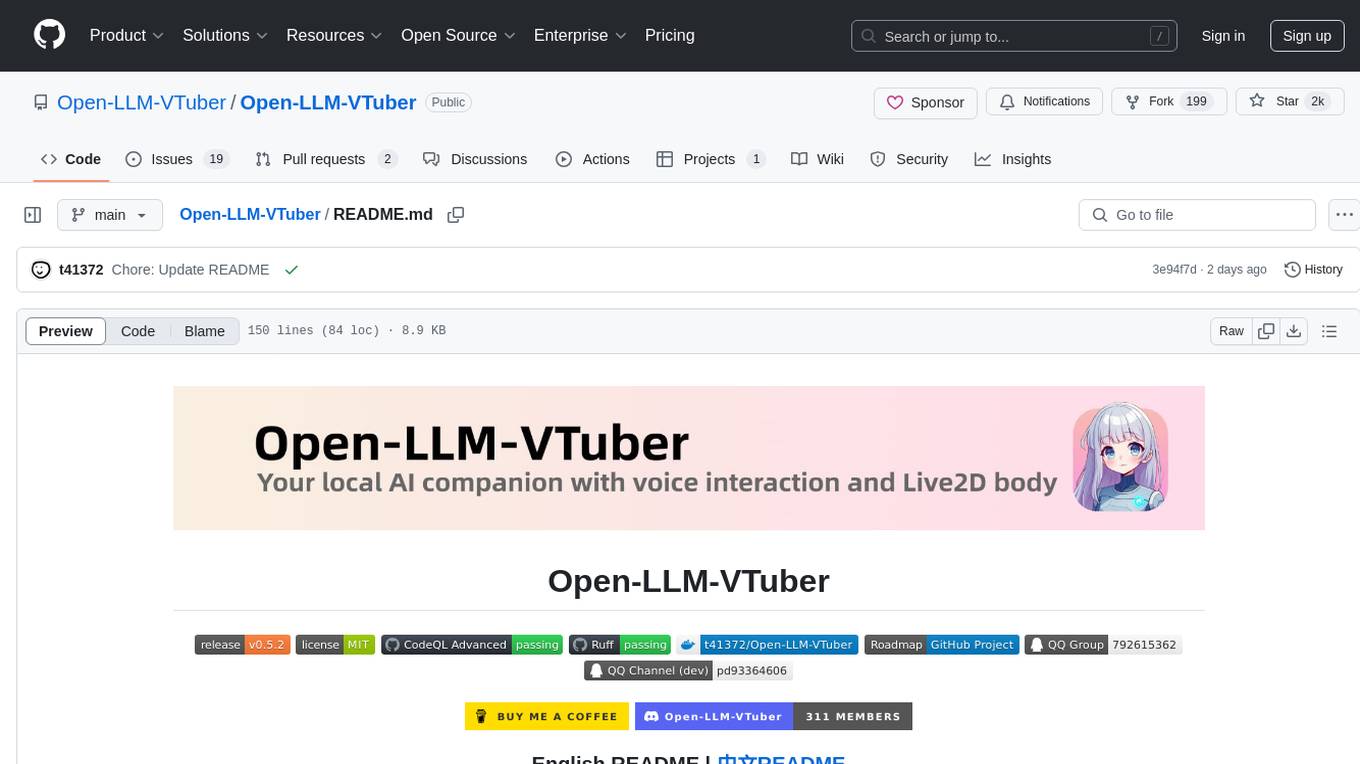
Open-LLM-VTuber
Open-LLM-VTuber is a voice-interactive AI companion supporting real-time voice conversations and featuring a Live2D avatar. It can run offline on Windows, macOS, and Linux, offering web and desktop client modes. Users can customize appearance and persona, with rich LLM inference, text-to-speech, and speech recognition support. The project is highly customizable, extensible, and actively developed with exciting features planned. It provides privacy with offline mode, persistent chat logs, and various interaction features like voice interruption, touch feedback, Live2D expressions, pet mode, and more.
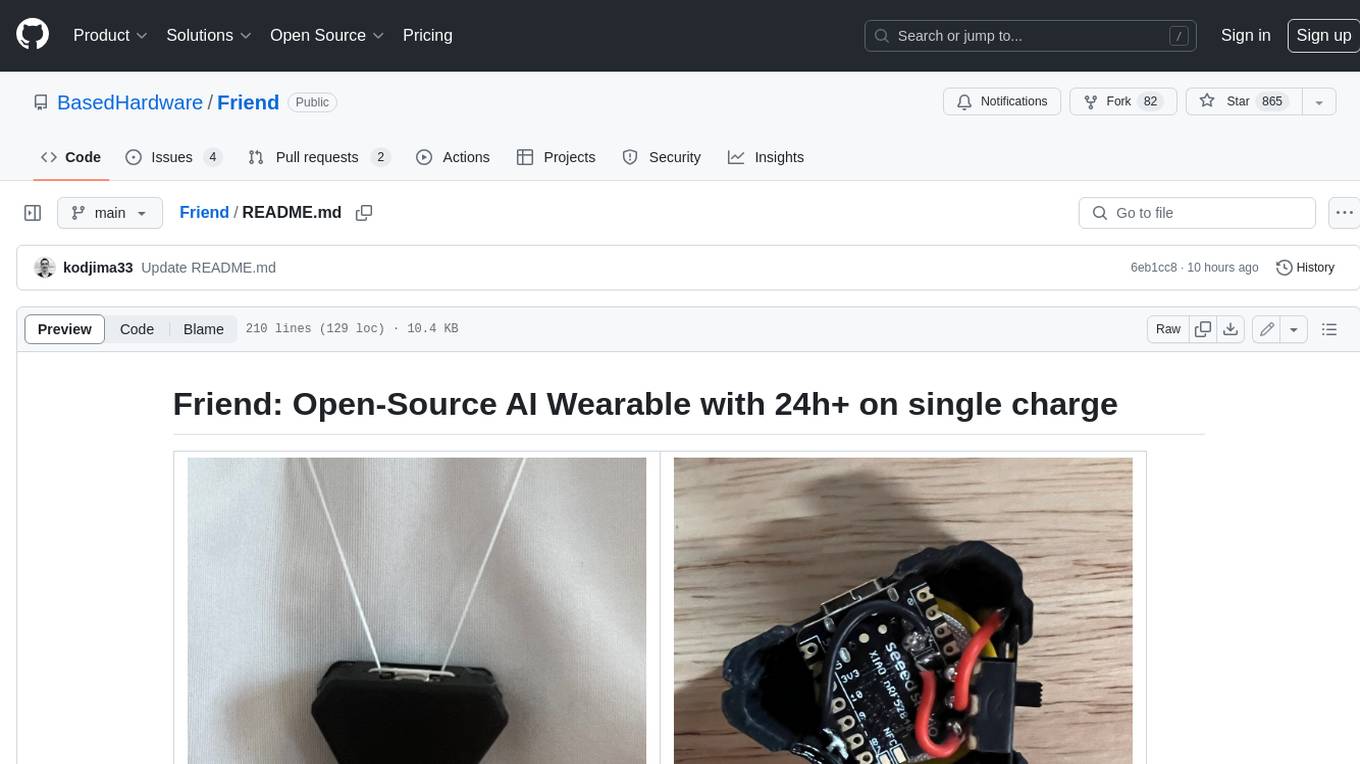
Friend
Friend is an open-source AI wearable device that records everything you say, gives you proactive feedback and advice. It has real-time AI audio processing capabilities, low-powered Bluetooth, open-source software, and a wearable design. The device is designed to be affordable and easy to use, with a total cost of less than $20. To get started, you can clone the repo, choose the version of the app you want to install, and follow the instructions for installing the firmware and assembling the device. Friend is still a prototype project and is provided "as is", without warranty of any kind. Use of the device should comply with all local laws and regulations concerning privacy and data protection.
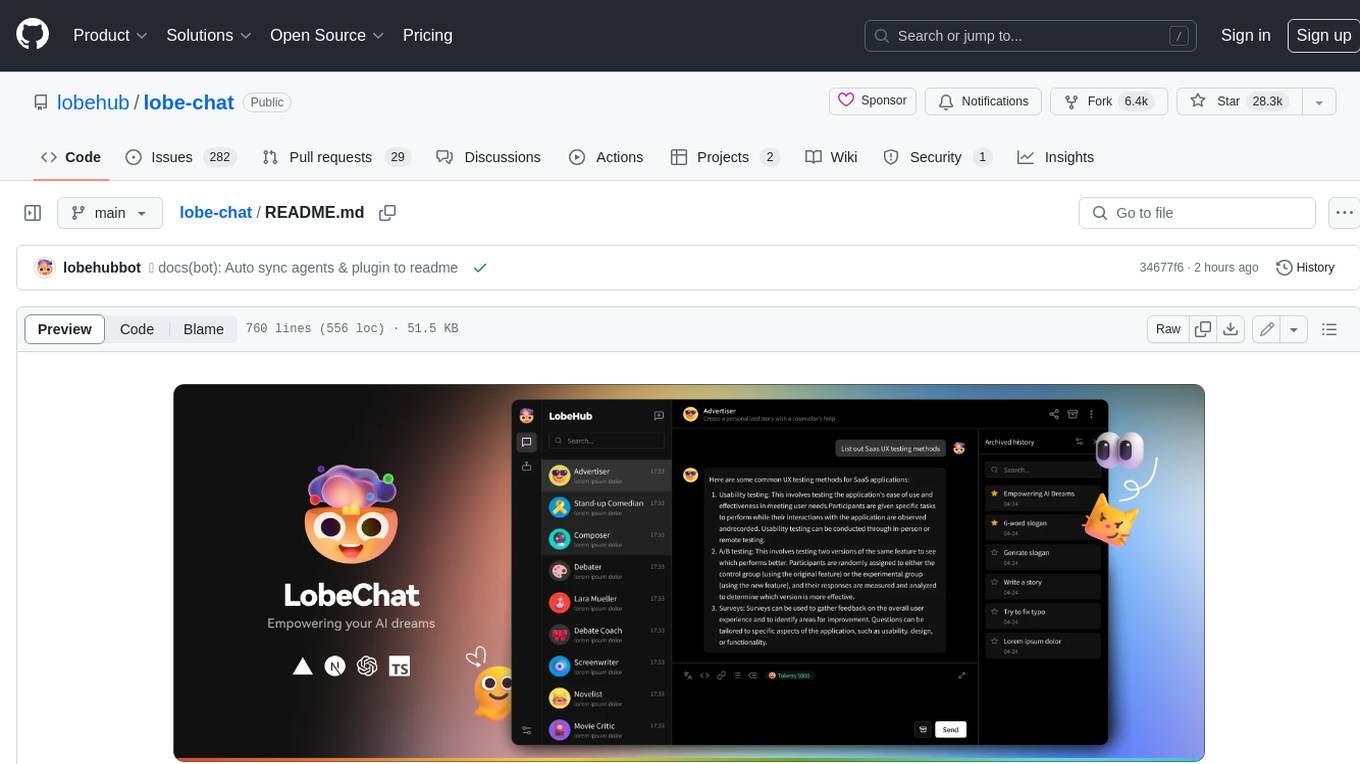
lobe-chat
Lobe Chat is an open-source, modern-design ChatGPT/LLMs UI/Framework. Supports speech-synthesis, multi-modal, and extensible ([function call][docs-functionc-call]) plugin system. One-click **FREE** deployment of your private OpenAI ChatGPT/Claude/Gemini/Groq/Ollama chat application.

dify
Dify is an open-source LLM app development platform that combines AI workflow, RAG pipeline, agent capabilities, model management, observability features, and more. It allows users to quickly go from prototype to production. Key features include: 1. Workflow: Build and test powerful AI workflows on a visual canvas. 2. Comprehensive model support: Seamless integration with hundreds of proprietary / open-source LLMs from dozens of inference providers and self-hosted solutions. 3. Prompt IDE: Intuitive interface for crafting prompts, comparing model performance, and adding additional features. 4. RAG Pipeline: Extensive RAG capabilities that cover everything from document ingestion to retrieval. 5. Agent capabilities: Define agents based on LLM Function Calling or ReAct, and add pre-built or custom tools. 6. LLMOps: Monitor and analyze application logs and performance over time. 7. Backend-as-a-Service: All of Dify's offerings come with corresponding APIs for easy integration into your own business logic.

khoj
Khoj is an open-source, personal AI assistant that extends your capabilities by creating always-available AI agents. You can share your notes and documents to extend your digital brain, and your AI agents have access to the internet, allowing you to incorporate real-time information. Khoj is accessible on Desktop, Emacs, Obsidian, Web, and Whatsapp, and you can share PDF, markdown, org-mode, notion files, and GitHub repositories. You'll get fast, accurate semantic search on top of your docs, and your agents can create deeply personal images and understand your speech. Khoj is self-hostable and always will be.
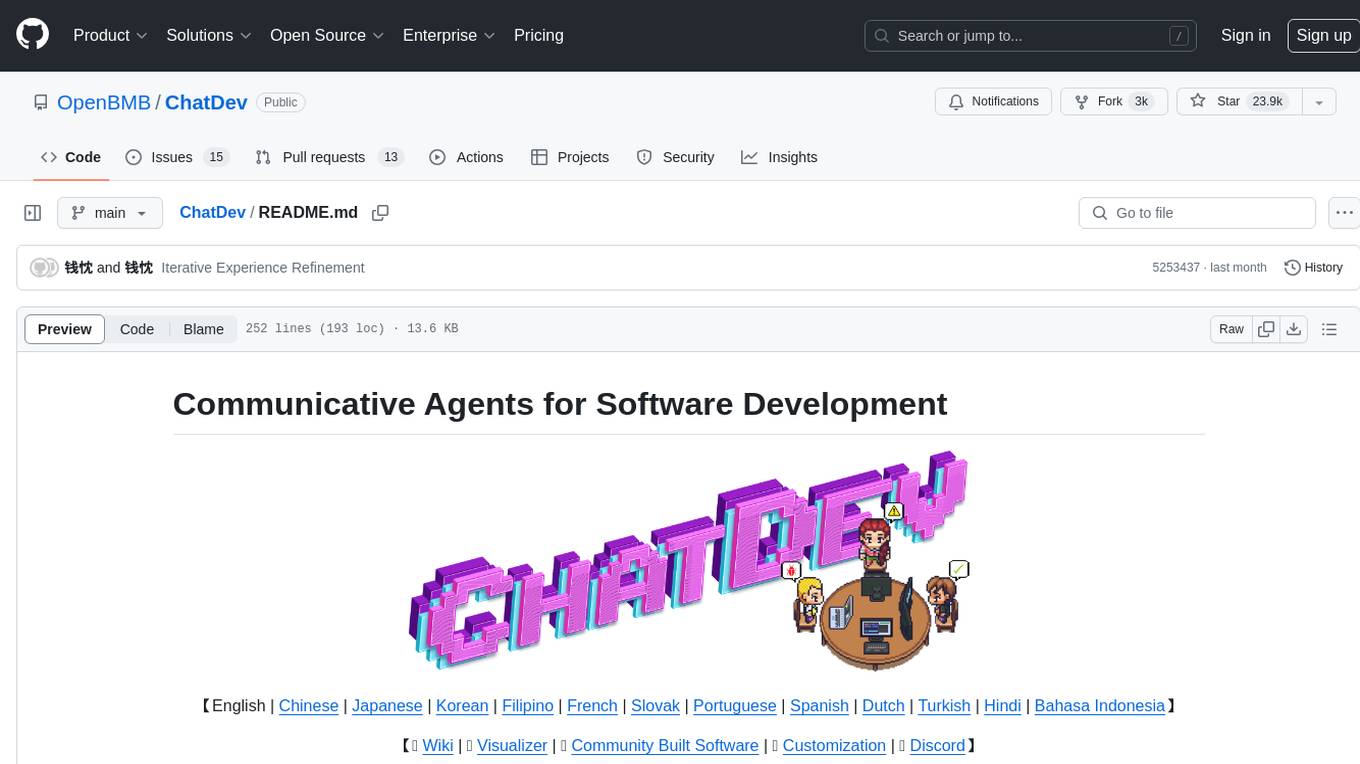
ChatDev
ChatDev is a virtual software company powered by intelligent agents like CEO, CPO, CTO, programmer, reviewer, tester, and art designer. These agents collaborate to revolutionize the digital world through programming. The platform offers an easy-to-use, highly customizable, and extendable framework based on large language models, ideal for studying collective intelligence. ChatDev introduces innovative methods like Iterative Experience Refinement and Experiential Co-Learning to enhance software development efficiency. It supports features like incremental development, Docker integration, Git mode, and Human-Agent-Interaction mode. Users can customize ChatChain, Phase, and Role settings, and share their software creations easily. The project is open-source under the Apache 2.0 License and utilizes data licensed under CC BY-NC 4.0.
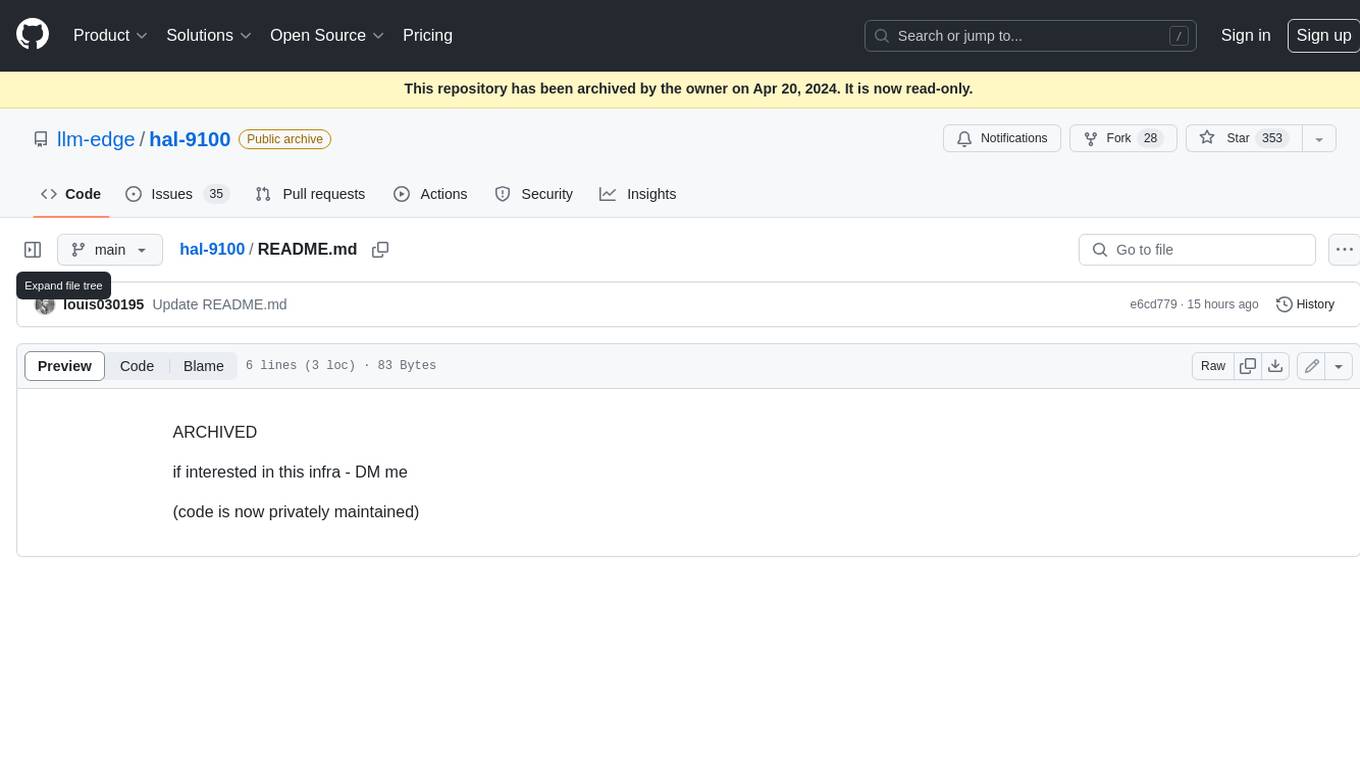
hal-9100
This repository is now archived and the code is privately maintained. If you are interested in this infrastructure, please contact the maintainer directly.
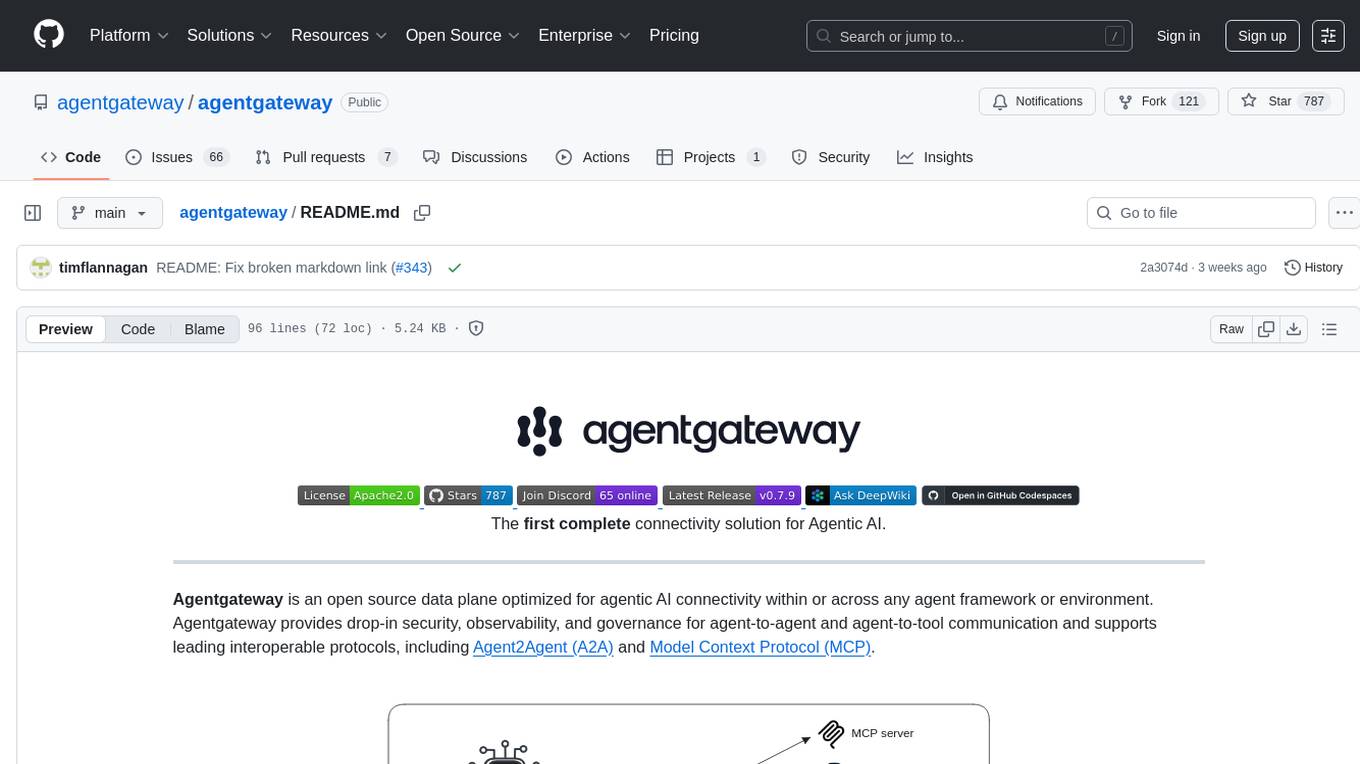
agentgateway
Agentgateway is an open source data plane optimized for agentic AI connectivity within or across any agent framework or environment. It provides drop-in security, observability, and governance for agent-to-agent and agent-to-tool communication, supporting leading interoperable protocols like Agent2Agent (A2A) and Model Context Protocol (MCP). Highly performant, security-first, multi-tenant, dynamic, and supporting legacy API transformation, agentgateway is designed to handle any scale and run anywhere with any agent framework.
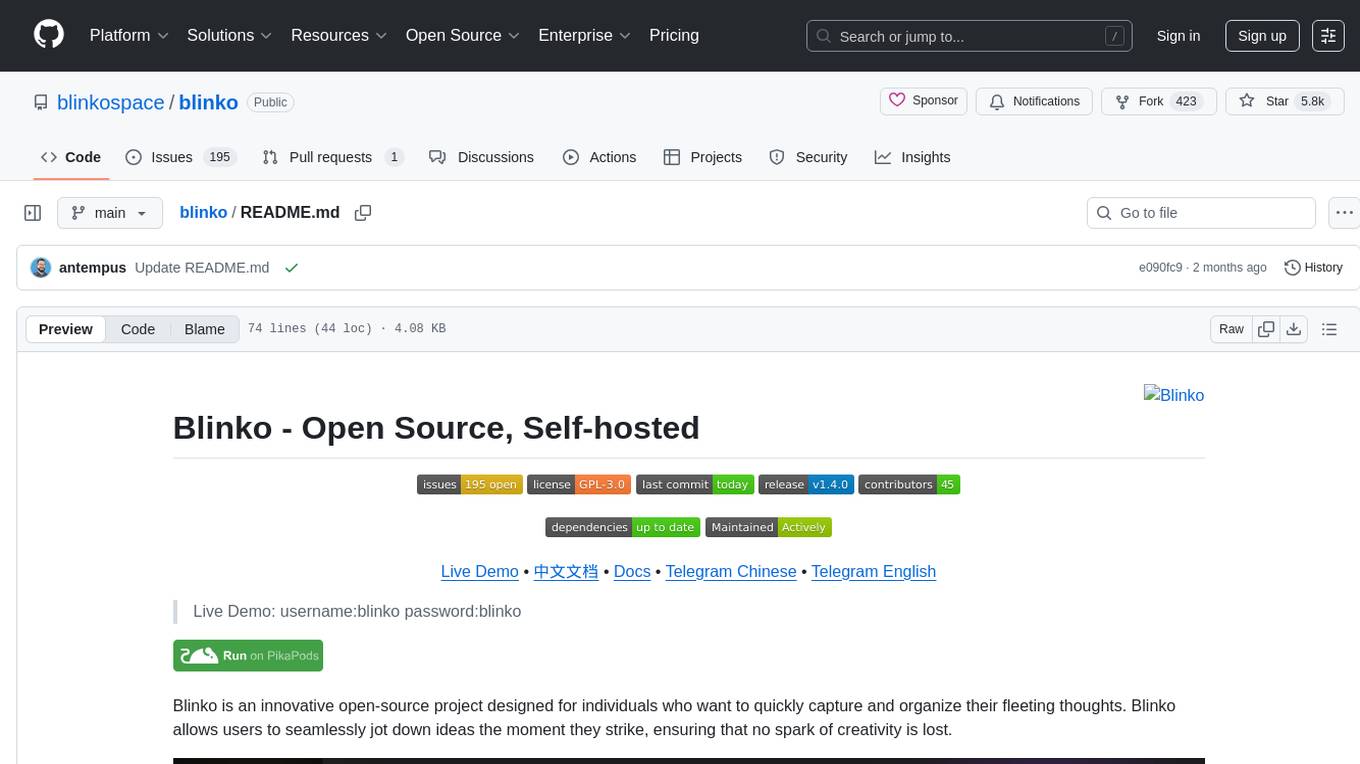
blinko
Blinko is an innovative open-source project designed for individuals who want to quickly capture and organize their fleeting thoughts. It allows users to seamlessly jot down ideas, ensuring no spark of creativity is lost. With AI-enhanced note retrieval, data ownership, efficient and fast note-taking, lightweight architecture, and open collaboration, Blinko offers a robust platform for managing and accessing notes effortlessly.
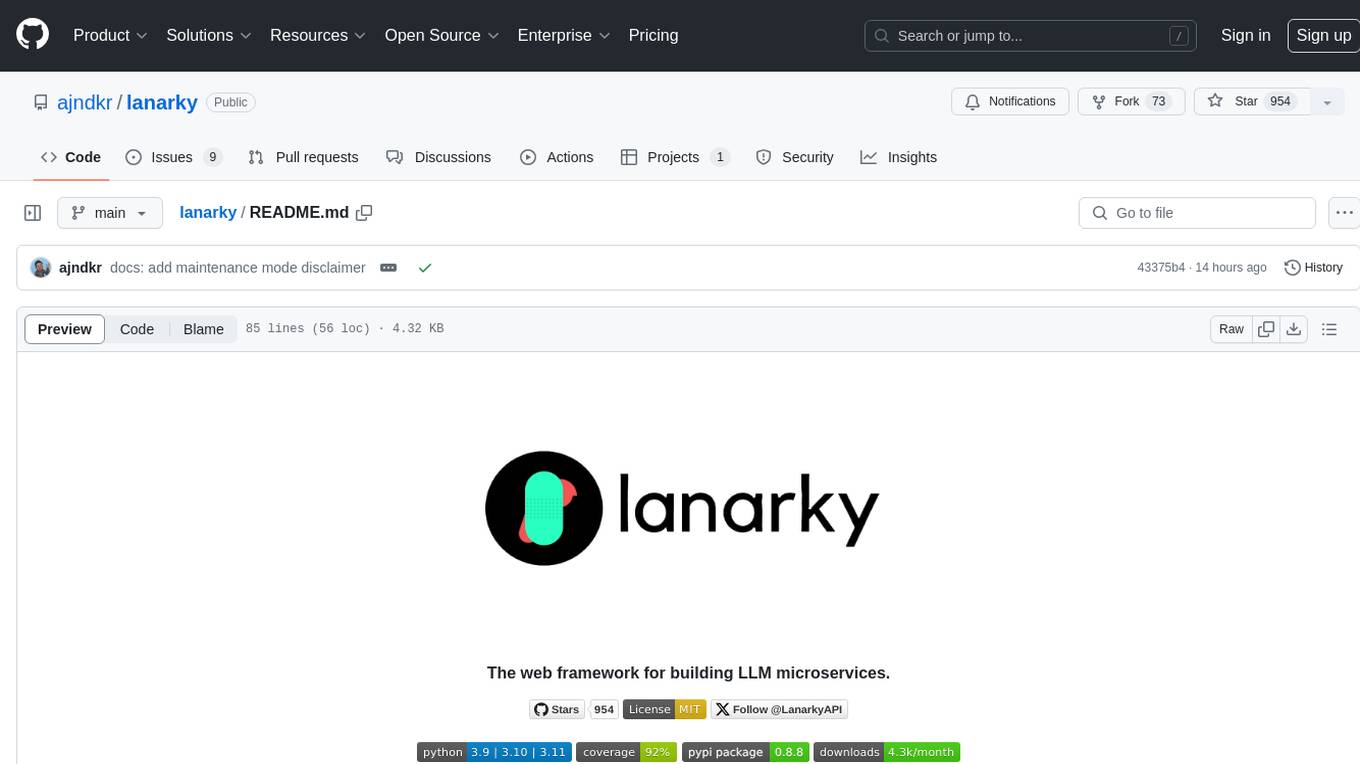
lanarky
Lanarky is a Python web framework designed for building microservices using Large Language Models (LLMs). It is LLM-first, fast, modern, supports streaming over HTTP and WebSockets, and is open-source. The framework provides an abstraction layer for developers to easily create LLM microservices. Lanarky guarantees zero vendor lock-in and is free to use. It is built on top of FastAPI and offers features familiar to FastAPI users. The project is now in maintenance mode, with no active development planned, but community contributions are encouraged.
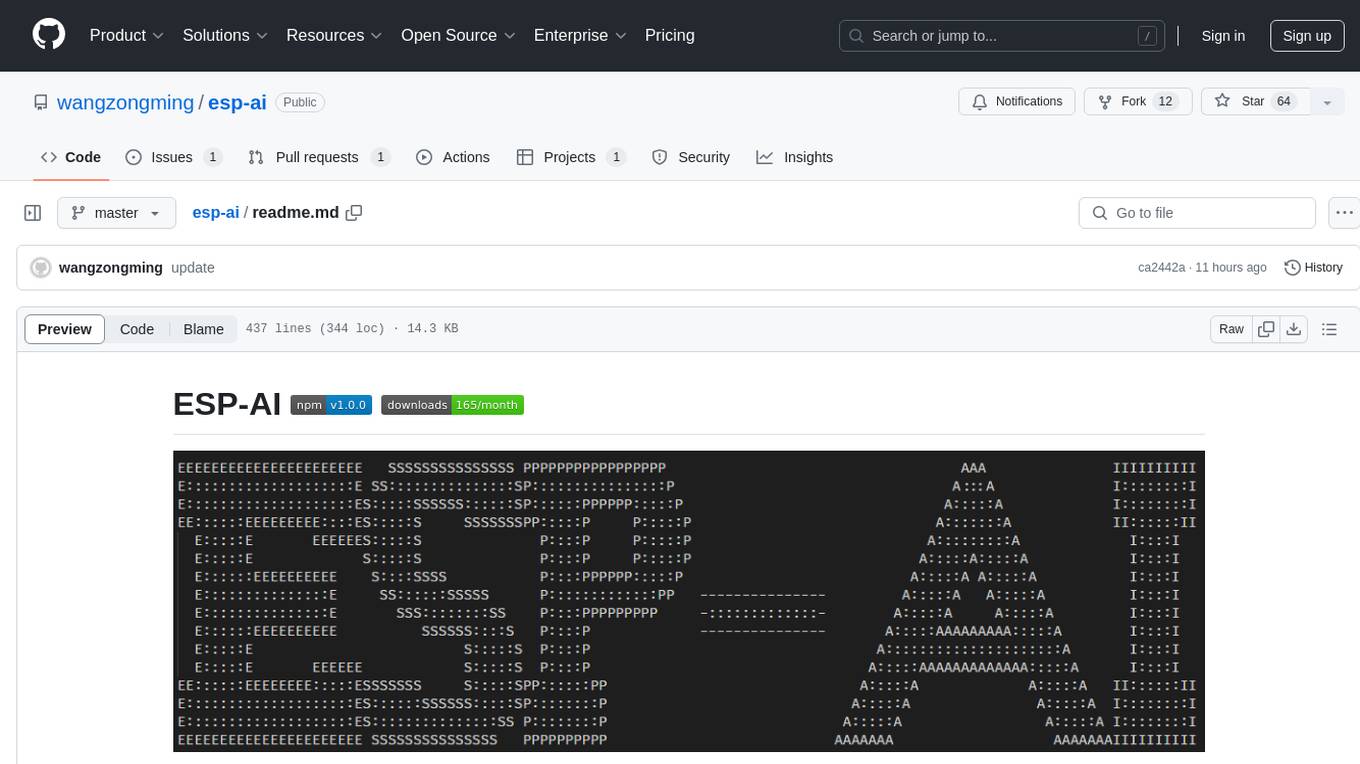
esp-ai
ESP-AI provides a complete AI conversation solution for your development board, including IAT+LLM+TTS integration solutions for ESP32 series development boards. It can be injected into projects without affecting existing ones. By providing keys from platforms like iFlytek, Jiling, and local services, you can run the services without worrying about interactions between services or between development boards and services. The project's server-side code is based on Node.js, and the hardware code is based on Arduino IDE.

anything-llm
AnythingLLM is a full-stack application that enables you to turn any document, resource, or piece of content into context that any LLM can use as references during chatting. This application allows you to pick and choose which LLM or Vector Database you want to use as well as supporting multi-user management and permissions.
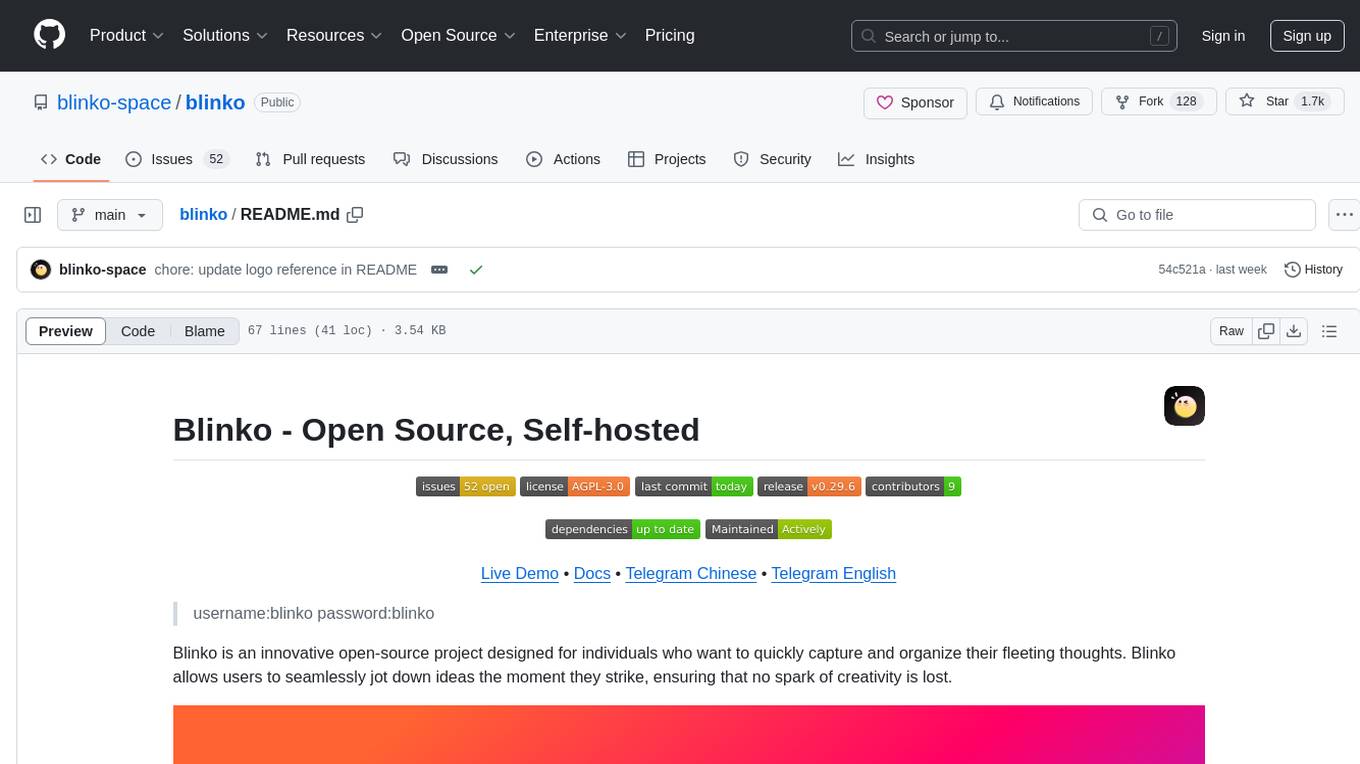
blinko
Blinko is an innovative open-source project designed for individuals who want to quickly capture and organize their fleeting thoughts. It allows users to seamlessly jot down ideas the moment they strike, ensuring that no spark of creativity is lost. With advanced AI-powered note retrieval, data ownership, efficient and fast capturing, lightweight architecture, and open collaboration, Blinko offers a comprehensive solution for managing and accessing notes.
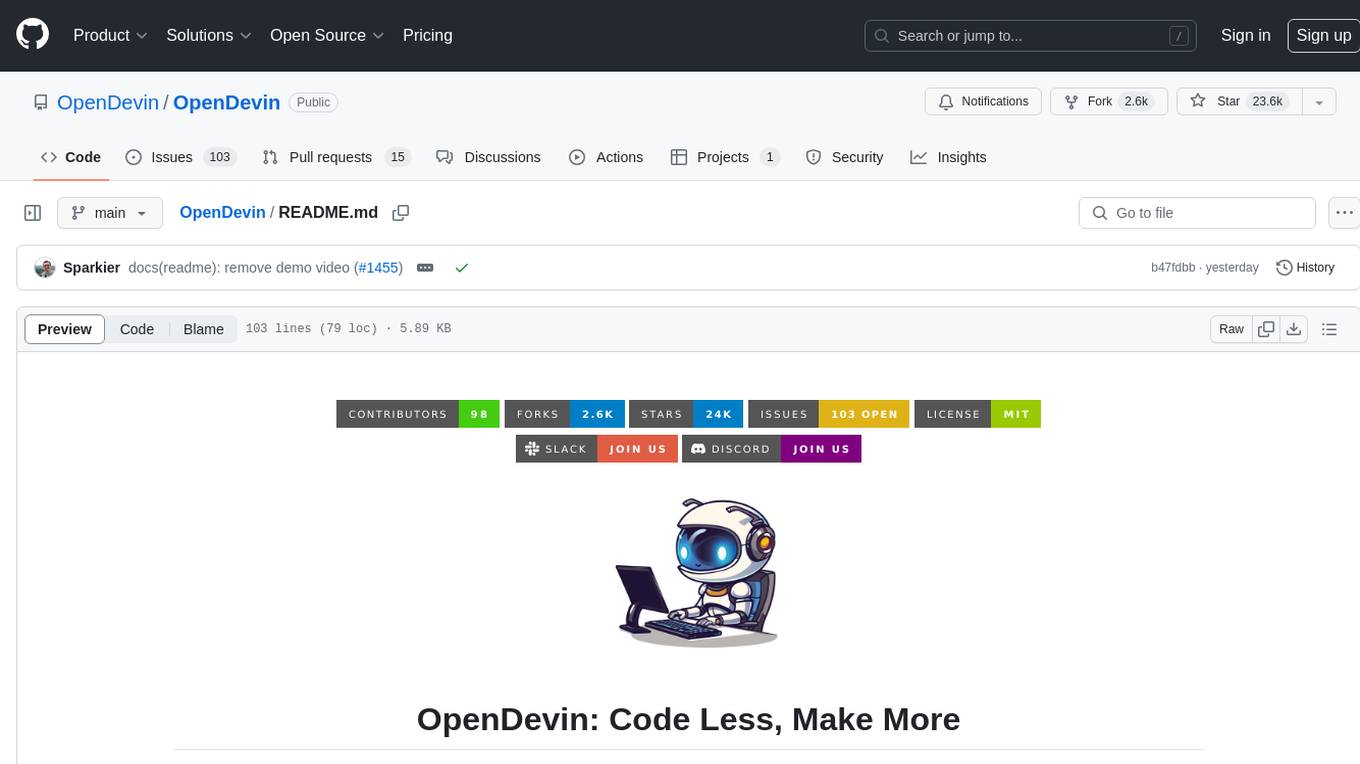
OpenDevin
OpenDevin is an open-source project aiming to replicate Devin, an autonomous AI software engineer capable of executing complex engineering tasks and collaborating actively with users on software development projects. The project aspires to enhance and innovate upon Devin through the power of the open-source community. Users can contribute to the project by developing core functionalities, frontend interface, or sandboxing solutions, participating in research and evaluation of LLMs in software engineering, and providing feedback and testing on the OpenDevin toolset.
For similar tasks

AI-Studio
MindWork AI Studio is a desktop application that provides a unified chat interface for Large Language Models (LLMs). It is free to use for personal and commercial purposes, offers independence in choosing LLM providers, provides unrestricted usage through the providers API, and is cost-effective with pay-as-you-go pricing. The app prioritizes privacy, flexibility, minimal storage and memory usage, and low impact on system resources. Users can support the project through monthly contributions or one-time donations, with opportunities for companies to sponsor the project for public relations and marketing benefits. Planned features include support for more LLM providers, system prompts integration, text replacement for privacy, and advanced interactions tailored for various use cases.

LLMStack
LLMStack is a no-code platform for building generative AI agents, workflows, and chatbots. It allows users to connect their own data, internal tools, and GPT-powered models without any coding experience. LLMStack can be deployed to the cloud or on-premise and can be accessed via HTTP API or triggered from Slack or Discord.

LocalAI
LocalAI is a free and open-source OpenAI alternative that acts as a drop-in replacement REST API compatible with OpenAI (Elevenlabs, Anthropic, etc.) API specifications for local AI inferencing. It allows users to run LLMs, generate images, audio, and more locally or on-premises with consumer-grade hardware, supporting multiple model families and not requiring a GPU. LocalAI offers features such as text generation with GPTs, text-to-audio, audio-to-text transcription, image generation with stable diffusion, OpenAI functions, embeddings generation for vector databases, constrained grammars, downloading models directly from Huggingface, and a Vision API. It provides a detailed step-by-step introduction in its Getting Started guide and supports community integrations such as custom containers, WebUIs, model galleries, and various bots for Discord, Slack, and Telegram. LocalAI also offers resources like an LLM fine-tuning guide, instructions for local building and Kubernetes installation, projects integrating LocalAI, and a how-tos section curated by the community. It encourages users to cite the repository when utilizing it in downstream projects and acknowledges the contributions of various software from the community.

AiTreasureBox
AiTreasureBox is a versatile AI tool that provides a collection of pre-trained models and algorithms for various machine learning tasks. It simplifies the process of implementing AI solutions by offering ready-to-use components that can be easily integrated into projects. With AiTreasureBox, users can quickly prototype and deploy AI applications without the need for extensive knowledge in machine learning or deep learning. The tool covers a wide range of tasks such as image classification, text generation, sentiment analysis, object detection, and more. It is designed to be user-friendly and accessible to both beginners and experienced developers, making AI development more efficient and accessible to a wider audience.

glide
Glide is a cloud-native LLM gateway that provides a unified REST API for accessing various large language models (LLMs) from different providers. It handles LLMOps tasks such as model failover, caching, key management, and more, making it easy to integrate LLMs into applications. Glide supports popular LLM providers like OpenAI, Anthropic, Azure OpenAI, AWS Bedrock (Titan), Cohere, Google Gemini, OctoML, and Ollama. It offers high availability, performance, and observability, and provides SDKs for Python and NodeJS to simplify integration.

jupyter-ai
Jupyter AI connects generative AI with Jupyter notebooks. It provides a user-friendly and powerful way to explore generative AI models in notebooks and improve your productivity in JupyterLab and the Jupyter Notebook. Specifically, Jupyter AI offers: * An `%%ai` magic that turns the Jupyter notebook into a reproducible generative AI playground. This works anywhere the IPython kernel runs (JupyterLab, Jupyter Notebook, Google Colab, Kaggle, VSCode, etc.). * A native chat UI in JupyterLab that enables you to work with generative AI as a conversational assistant. * Support for a wide range of generative model providers, including AI21, Anthropic, AWS, Cohere, Gemini, Hugging Face, NVIDIA, and OpenAI. * Local model support through GPT4All, enabling use of generative AI models on consumer grade machines with ease and privacy.

langchain_dart
LangChain.dart is a Dart port of the popular LangChain Python framework created by Harrison Chase. LangChain provides a set of ready-to-use components for working with language models and a standard interface for chaining them together to formulate more advanced use cases (e.g. chatbots, Q&A with RAG, agents, summarization, extraction, etc.). The components can be grouped into a few core modules: * **Model I/O:** LangChain offers a unified API for interacting with various LLM providers (e.g. OpenAI, Google, Mistral, Ollama, etc.), allowing developers to switch between them with ease. Additionally, it provides tools for managing model inputs (prompt templates and example selectors) and parsing the resulting model outputs (output parsers). * **Retrieval:** assists in loading user data (via document loaders), transforming it (with text splitters), extracting its meaning (using embedding models), storing (in vector stores) and retrieving it (through retrievers) so that it can be used to ground the model's responses (i.e. Retrieval-Augmented Generation or RAG). * **Agents:** "bots" that leverage LLMs to make informed decisions about which available tools (such as web search, calculators, database lookup, etc.) to use to accomplish the designated task. The different components can be composed together using the LangChain Expression Language (LCEL).

infinity
Infinity is an AI-native database designed for LLM applications, providing incredibly fast full-text and vector search capabilities. It supports a wide range of data types, including vectors, full-text, and structured data, and offers a fused search feature that combines multiple embeddings and full text. Infinity is easy to use, with an intuitive Python API and a single-binary architecture that simplifies deployment. It achieves high performance, with 0.1 milliseconds query latency on million-scale vector datasets and up to 15K QPS.
For similar jobs

ChatFAQ
ChatFAQ is an open-source comprehensive platform for creating a wide variety of chatbots: generic ones, business-trained, or even capable of redirecting requests to human operators. It includes a specialized NLP/NLG engine based on a RAG architecture and customized chat widgets, ensuring a tailored experience for users and avoiding vendor lock-in.

anything-llm
AnythingLLM is a full-stack application that enables you to turn any document, resource, or piece of content into context that any LLM can use as references during chatting. This application allows you to pick and choose which LLM or Vector Database you want to use as well as supporting multi-user management and permissions.

ai-guide
This guide is dedicated to Large Language Models (LLMs) that you can run on your home computer. It assumes your PC is a lower-end, non-gaming setup.

classifai
Supercharge WordPress Content Workflows and Engagement with Artificial Intelligence. Tap into leading cloud-based services like OpenAI, Microsoft Azure AI, Google Gemini and IBM Watson to augment your WordPress-powered websites. Publish content faster while improving SEO performance and increasing audience engagement. ClassifAI integrates Artificial Intelligence and Machine Learning technologies to lighten your workload and eliminate tedious tasks, giving you more time to create original content that matters.

mikupad
mikupad is a lightweight and efficient language model front-end powered by ReactJS, all packed into a single HTML file. Inspired by the likes of NovelAI, it provides a simple yet powerful interface for generating text with the help of various backends.

glide
Glide is a cloud-native LLM gateway that provides a unified REST API for accessing various large language models (LLMs) from different providers. It handles LLMOps tasks such as model failover, caching, key management, and more, making it easy to integrate LLMs into applications. Glide supports popular LLM providers like OpenAI, Anthropic, Azure OpenAI, AWS Bedrock (Titan), Cohere, Google Gemini, OctoML, and Ollama. It offers high availability, performance, and observability, and provides SDKs for Python and NodeJS to simplify integration.

onnxruntime-genai
ONNX Runtime Generative AI is a library that provides the generative AI loop for ONNX models, including inference with ONNX Runtime, logits processing, search and sampling, and KV cache management. Users can call a high level `generate()` method, or run each iteration of the model in a loop. It supports greedy/beam search and TopP, TopK sampling to generate token sequences, has built in logits processing like repetition penalties, and allows for easy custom scoring.

firecrawl
Firecrawl is an API service that takes a URL, crawls it, and converts it into clean markdown. It crawls all accessible subpages and provides clean markdown for each, without requiring a sitemap. The API is easy to use and can be self-hosted. It also integrates with Langchain and Llama Index. The Python SDK makes it easy to crawl and scrape websites in Python code.

